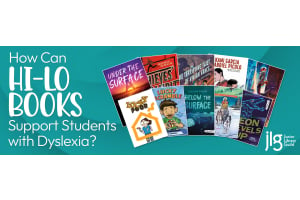Using Books to Facilitate Difficult Conversations


Let’s face it, growing up is hard. Kids are facing more than ever before and experiencing challenges that we could not have imagined at their age. This makes it critically important for parents, teachers, and educators to engage in difficult conversations with young people, and your library may be able to help.
There is a reason books have been treasured throughout history. The right book can break down walls, increase understanding, foster emotional intelligence, diminish fears, validate feelings, and even help readers cope. Books are a great way to start a dialogue about the tough stuff life throws at your students.
Books can help young people feel less alone
One of the biggest benefits of introducing books with sensitive subject matter is that it helps the kids and teenagers humanize their own experiences. Books that they relate to can give them the words to talk about what they are facing. While we want to do everything to protect our children, there is no doubt that many are working through difficult situations that we could have never imagined at their age.
Author James Baldwin once said, “You think your pain and your heartbreak are unprecedented in the history of the world, but then you read. It was books that taught me that the things that tormented me most were the very things that connected me with all the people who were alive, who had ever been alive.”
When a young person is struggling, they may not always have the outward communication they need to talk to their loved ones or ask for help. For example, a student at home struggling with domestic violence or abuse may not always realize that this is abnormal. A middle schooler struggling with an eating disorder may not even understand what is happening to them. When we add books to our collections that cover these topics and help to educate our young people, we help to give them the words to express themselves, to seek help, and to start a conversation with a trusted adult.
Books offer us a safe space for questions
One of the biggest benefits of using literature to spark difficult conversations is that it allows us to have these discussions in a safe and respectful place. The talks can be proactive and initiated in response to a specific book or story, not reactive in response to a real-world event. This allows students to feel safe asking questions, analyzing subject matter, and exploring the topics at hand. These stories usually bring up more questions, which lead to new perspectives, personal growth, and more reading! They allow us to explore “what was this character thinking?” and “how could this person have been feeling” in a safe and neutral environment.
Books show us a new perspective
Books can be representative of your local population, or they can show you the perspectives of people from the other side of the world. To quote the great Atticus Finch from Harper Lee’s “To Kill a Mockingbird” - “You’ll never really understand a person until you consider things from his point of view...Until you climb inside of his skin and walk around in it.” Books give us the means to do just that.
It is also very important to expose your readers to people from all different communities. A great example of this are books with LGBTQIA+ themes, characters, and storylines. There is a wide array of levels of LGBTQIA+ representation in different parts of our country. Because of this, students in urban settings, for instance, may be exposed to more members of this community than students from suburban areas. By introducing books with LGBTQIA+ representation, we help our young people build empathy and understanding towards a group of people they may not regularly interact with.
If your students have only grown up around people who look and think and act like them, books with diverse characters, settings, and plots can help them think outside the box and to see the perspectives of others. This is a great way to foster acceptance and inclusion.
If you are looking for ways to talk about potentially sensitive topics with your students, we are here to support you. Our selections cover a wide array of subject matter, and we include content notifications for our books. This can help you choose titles specifically for content you want added to your library. Visit our website to learn more about how our memberships can help support you and your readers.









